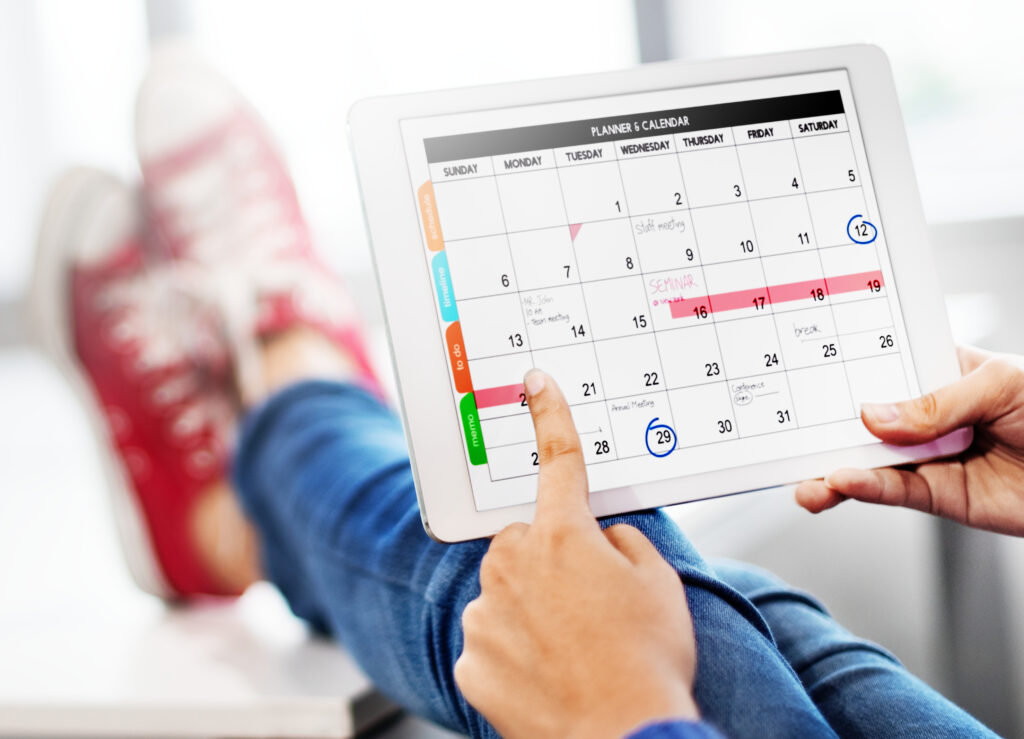
28 Aug 8 Essential Tips for Setting Deadlines
Planning an event can be daunting with so many details that need to come together seamlessly. One of the most crucial aspects of successful event planning is setting deadlines. Properly managed deadlines ensure everything is on track and the event goes off without a hitch.
Here are eight essential tips to help you set effective deadlines for your next event.
1. Break Down the Timeline
A successful event is the result of meticulous planning. Start by identifying all the key tasks that need to be completed. Once you’ve listed out these tasks, break each one down into smaller, manageable steps. For instance, venue selection might involve researching potential venue locations, visiting venues, booking a venue, and setting up the venue with décor, equipment, and catering. Set specific deadlines for each step. This granular approach ensures that no detail is overlooked and that every aspect of the event is covered. Learn more about creating a timeline.
2. Be Realistic About Timeframes
It’s tempting to set tight deadlines to push yourself or your team to deliver faster results. However, setting unrealistic deadlines often backfires. Instead of rushing, assess how long each task genuinely takes and build in some buffer time for unexpected delays or challenges. By giving yourself a reasonable amount of time, you’re more likely to produce high-quality work and avoid last-minute stress.
Key Tip:
Break large projects into smaller tasks and assign a deadline for each. This prevents the overwhelming feeling of one big looming deadline.

Creating a detailed timeline is essential for successful event planning, ensuring every task is completed on schedule and nothing is overlooked. Photo by Rawpixel
3. Prioritise Tasks
Not all tasks are created equal. Some are more critical and need to be completed earlier in the planning process. For example, booking the venue and securing key vendors should be high on your priority list, as these elements often dictate other decisions. Use prioritisation methods like the Eisenhower Matrix to categorise tasks by their importance and urgency. This way, you can set deadlines for the most critical tasks first, ensuring you’re always working on what matters most. Prioritising tasks helps prevent last-minute rushes and allows more time to handle any unexpected issues that may arise.
Key Tip:
Focus on the tasks that move you closer to your goals. Establish deadlines for high-priority tasks and schedule low-priority ones around them.
4. Work Backwards from the Event Date
One of the most effective ways to set deadlines is to start with the event date and work backward. Identify the final deadline for when everything needs to be ready, and then set intermediate deadlines for each task along the way. This approach ensures that all tasks align properly and are completed on time. Don’t forget to build in some buffer time for each deadline to accommodate any delays or unexpected challenges. This extra time can be a lifesaver when things don’t go as planned.

A well-structured timeline ensures the planning process moves forward smoothly, keeping your event organised and on track. Photo by davidpereiras
5. Regular Checkpoints
Setting regular checkpoints or progress reviews is crucial for staying on track. These checkpoints serve as mini-deadlines and provide opportunities to assess progress and make necessary adjustments. Regularly reviewing your timeline allows you to identify potential issues early and address them promptly. Whether you have weekly meetings or bi-weekly check-ins, these regular updates help keep everyone accountable and ensure that the planning process is moving forward smoothly.
Key Tip:
Create a visual timeline or project board to track milestones. Tools like Trello, Asana, or Gantt charts can be useful for organising these checkpoints.
6. Communicate Clearly
Clear communication is the backbone of effective deadline management. Make sure that all team members, vendors, and stakeholders are aware of their respective deadlines and the overall timeline. Use project management tools, shared calendars, or collaboration platforms to keep everyone informed and aligned. Clearly communicating deadlines helps everyone understand their responsibilities and the importance of meeting them. It also reduces the risk of miscommunication and ensures that everyone is working towards the same goal.

Collaborative planning with colleagues ensures diverse perspectives, shared responsibilities, and a smoother path to a successful event. Photo by yurakrasil
7. Consider External Factors and Dependencies
When setting deadlines, take into account external factors such as team schedules, stakeholder availability, and dependency on other tasks or people. Coordinating with others can often lead to delays, so consider these variables when planning deadlines. Adjust your timeline accordingly to avoid bottlenecks and ensure a smooth workflow.
8. Build in Flexibility for Adjustments
Deadlines should push you to work efficiently, but they should also allow for some flexibility in case of unforeseen circumstances. Life happens, and being overly rigid can lead to frustration or burnout if things don’t go as planned. Build in some buffer time for emergencies or last-minute changes so you can adjust deadlines if necessary without compromising the entire project.
Key Tip:
When setting a deadline, consider setting an “ideal” deadline (the best-case scenario) and a “hard” deadline (the final, no-extension date). This gives you flexibility if needed but still keeps you on track.
Setting and managing deadlines is one of the most critical components of successful event planning. It is also is about finding the balance between urgency and realism. These tips will help you stay organised, reduce stress, and ultimately deliver a successful event that meets your goals and exceeds expectations. Happy planning!
Have you also read these articles?
Maximising Social Media for Event Venues
Creating Gender-Inclusive Events


